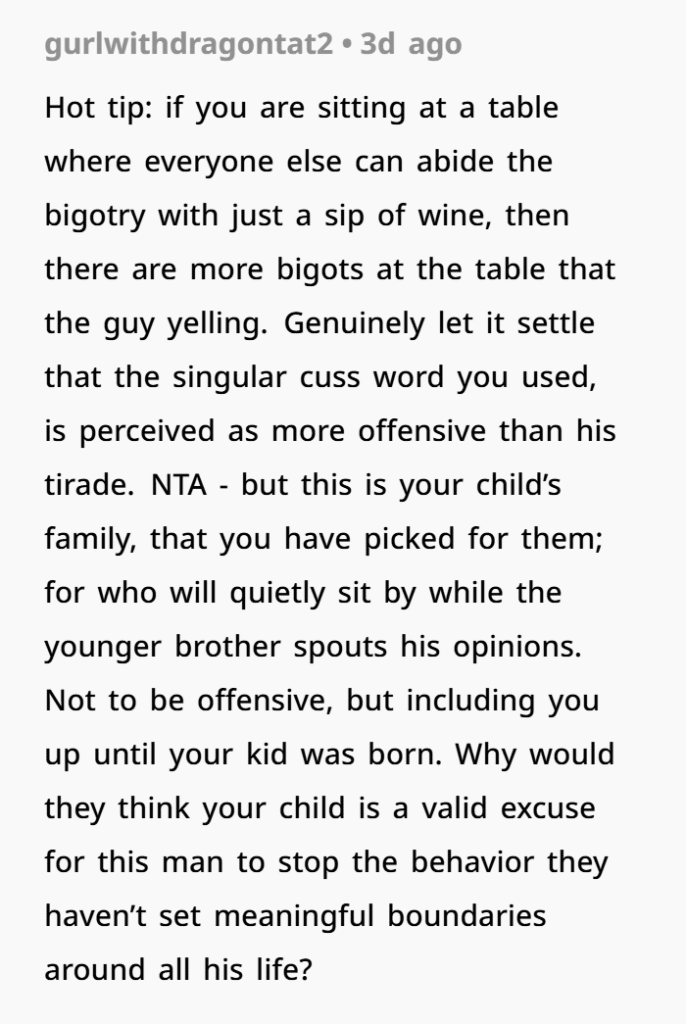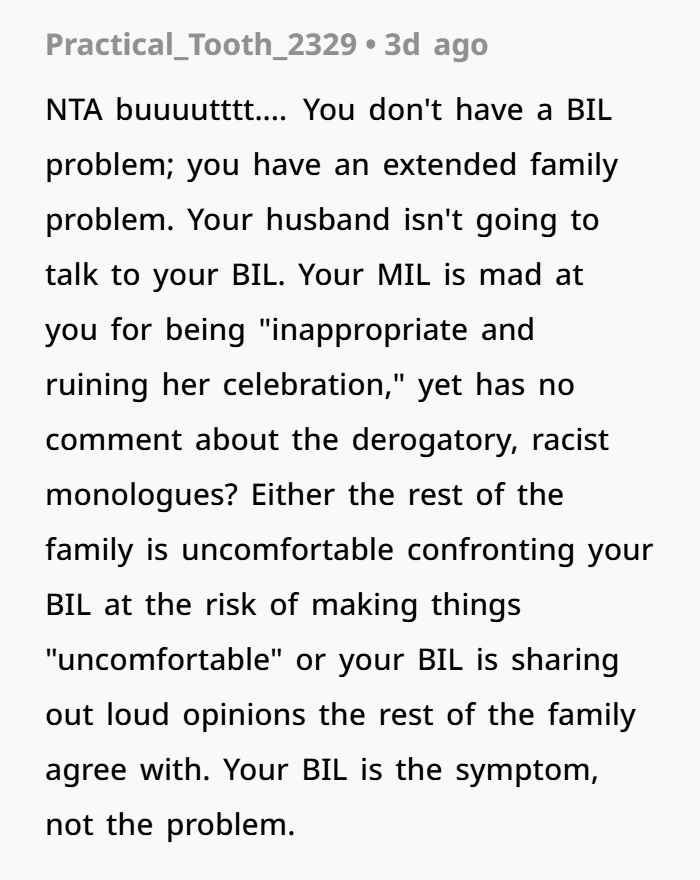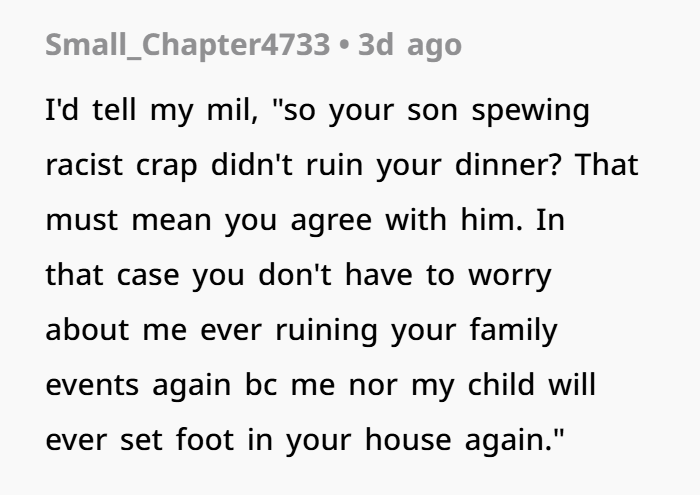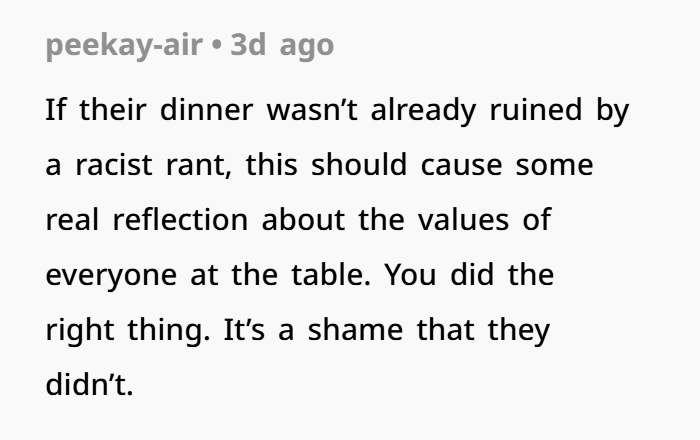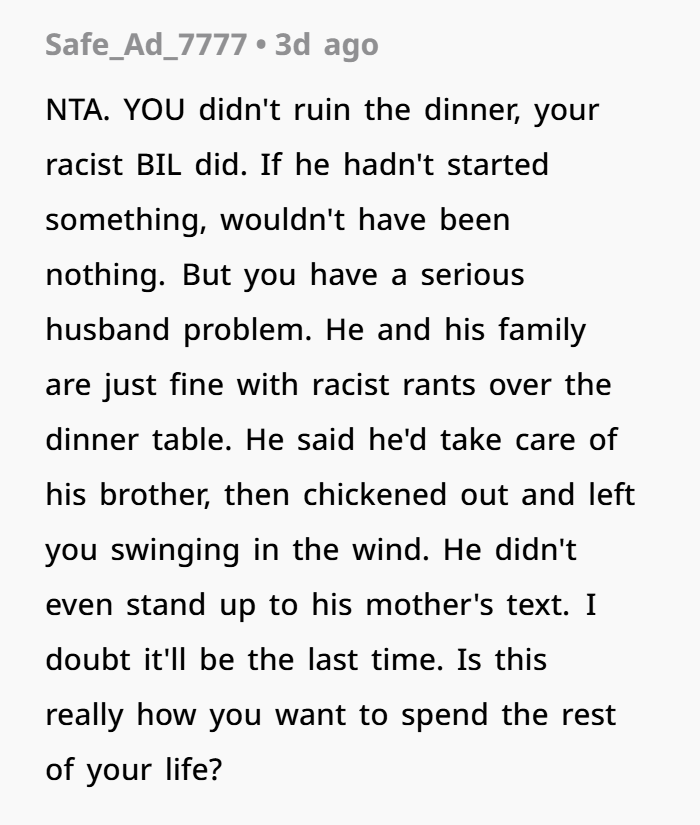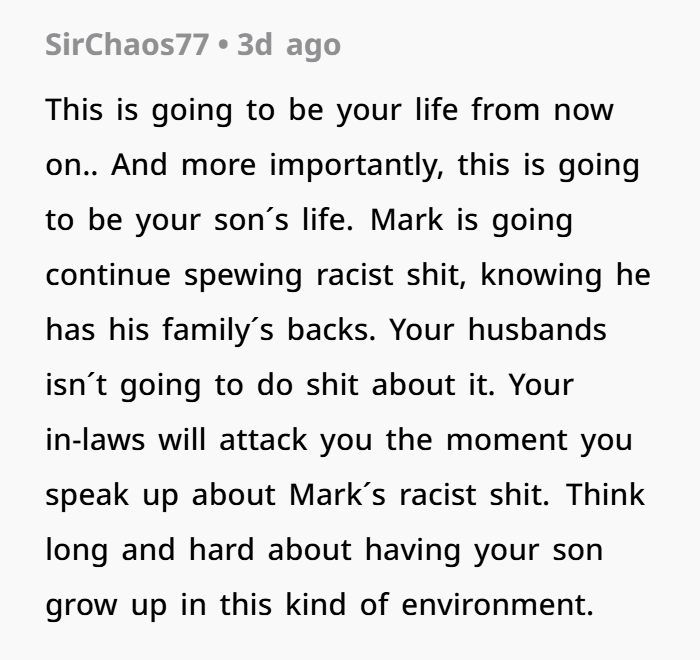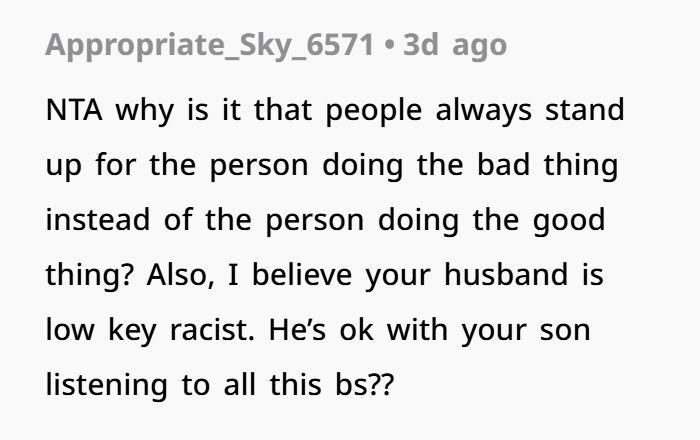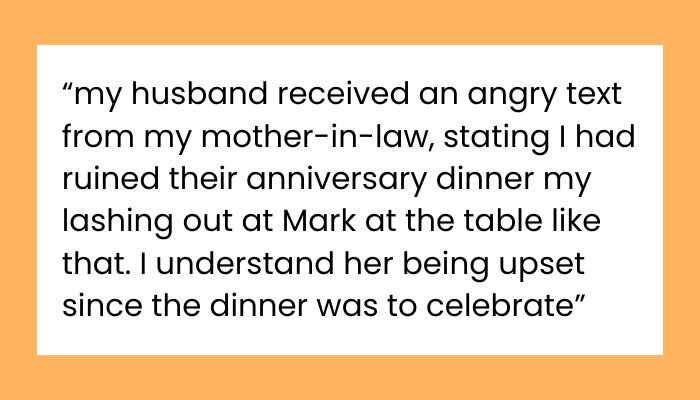Wife Snaps At Brother-In-Law For Dropping Racist Slurs At Dinner Mother-In-Law Says She’s The One Who Ruined The Night
You, your husband, and your nearly-one-year-old son went to your in‑laws’ anniversary dinner with the rest of the family. Your brother‑in‑law Mark, after a few drinks, began making racist remarks (slurs or disparaging comments). You looked to your husband, expecting intervention, but he stayed silent. You couldn’t hold it in any longer and snapped at Mark, telling him to shut up if he had nothing smarter to say. The room turned icy, dinner ended early, tension erupted afterward.
Your mother‑in‑law is angry, saying you ruined their anniversary. You admit your timing might have been bad, but you also feel the outrage was justified. You wonder: are you the asshole?
Knowing when to speak up against offensive behavior is never easy, especially when it involves people close to us

The author, a mother of an almost-one-year-old, had long tolerated her brother-in-law’s racist and inappropriate comments at family events
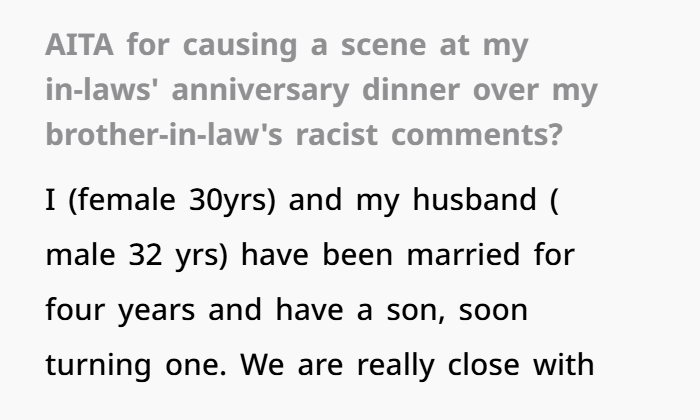

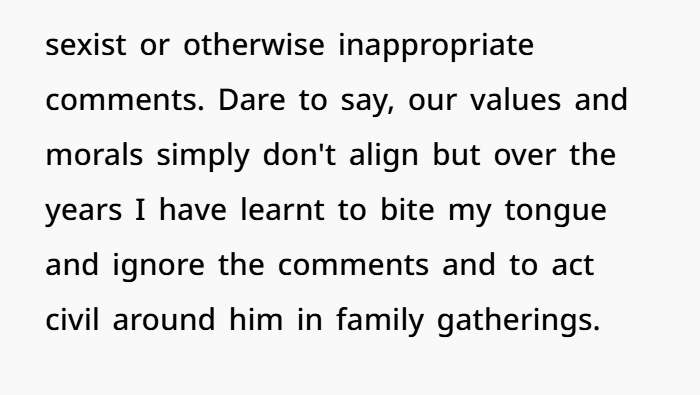
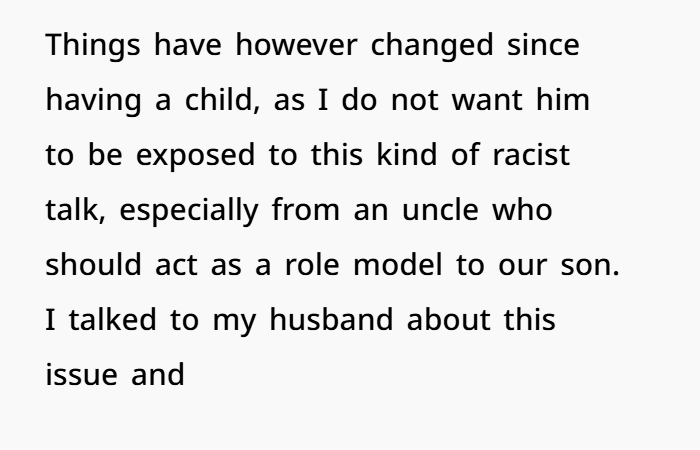
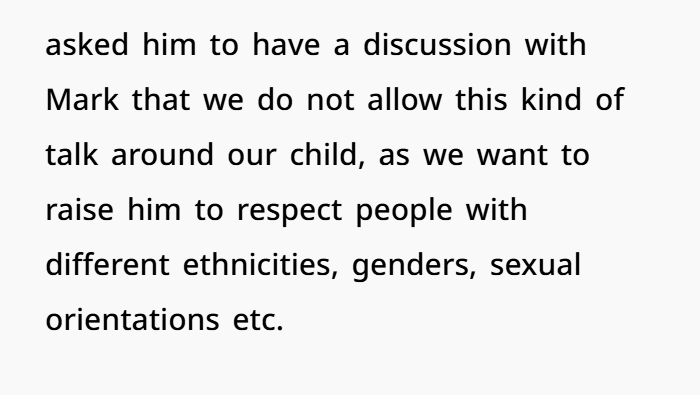
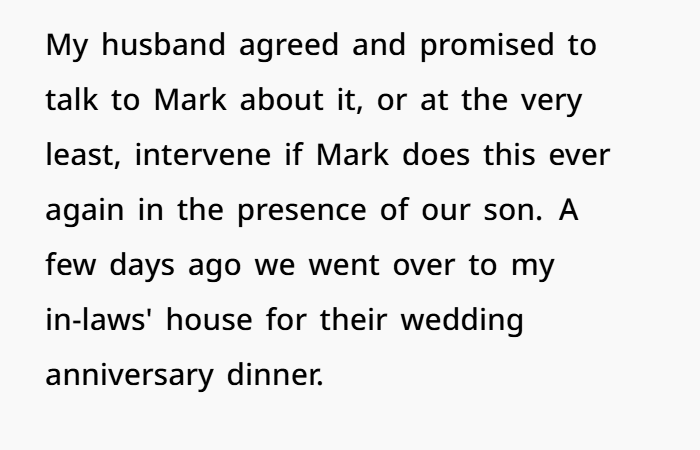

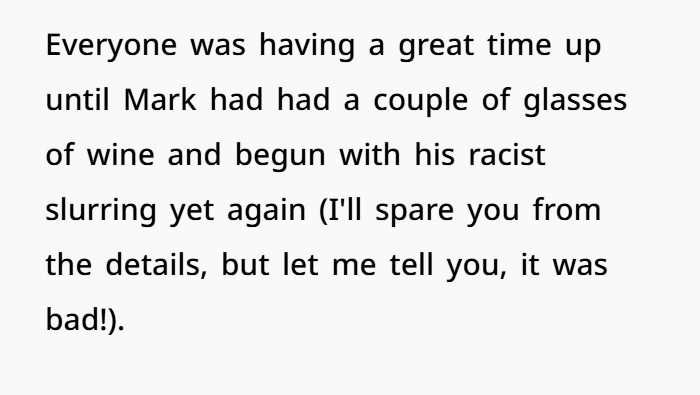
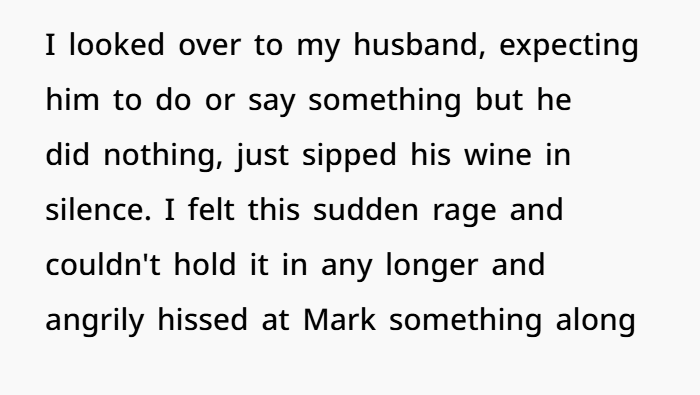
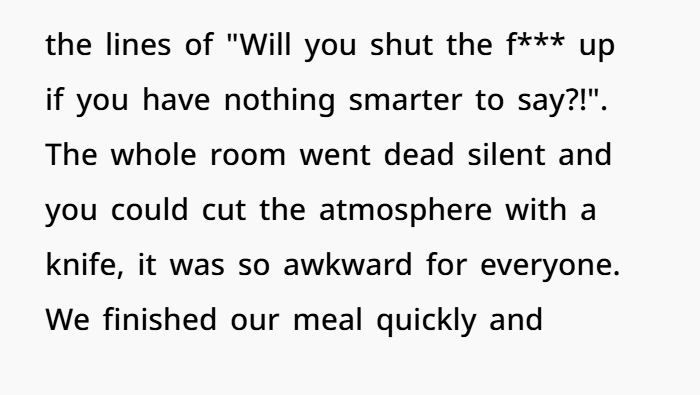
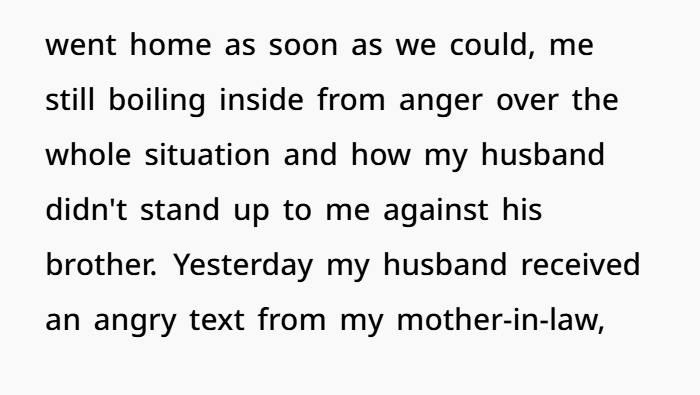
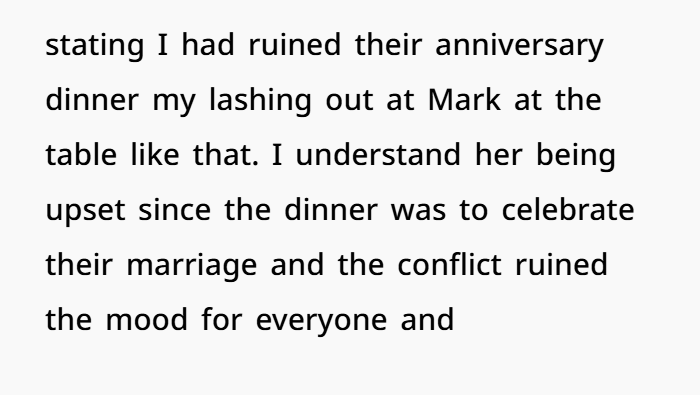
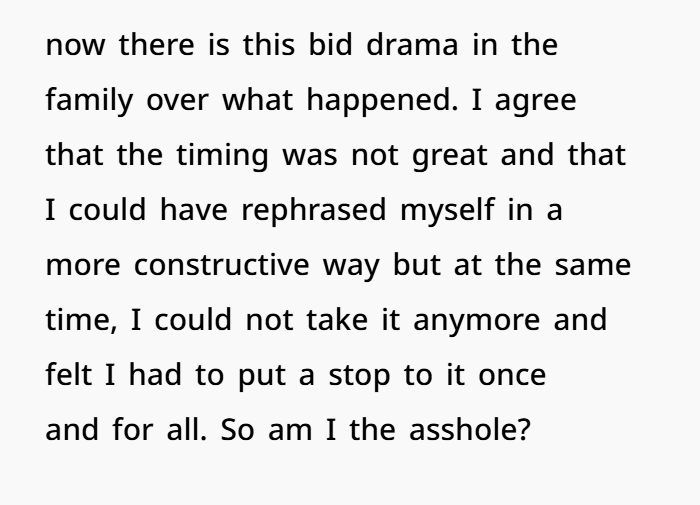

Below I dig into the dynamics, moral weight, possible missteps, and how to think through what comes next.
1. Silence vs. speaking out: moral imperative when racism is involved
One big principle: when someone utters racism, silence often becomes complicity. If you stay quiet, that conveys tacit agreement or acceptance, especially in a family setting. You wanted your child’s environment to reflect your values, to model respect, inclusion, and dignity. Letting racist talk slide in front of your kid is a risk you understandably were no longer willing to take.
Given you had already communicated with your husband that this had to change, it makes sense your frustration boiled over. To protect your child and your values — especially when a known offender is present — some confrontation is to be expected.
2. The cost of confrontation in family settings
Family dinner occasions, anniversaries, holidays — these are emotionally loaded, high‑expectation events where people assume civility, celebration, and unity. Conflict in those moments feels more disruptive than in neutral settings.
By lashing out in that moment you amplified the stakes. People may see your intervention as escalation rather than defense of values. Others may judge that there was a better time to talk. In family settings, confrontations are often seen as personal attacks, not principled stands.
Also, alcohol reduces restraint and raises risk. Mark had been drinking, so his remarks may have been louder, more aggressive. Your reaction was also emotional. That amplifies the shock.
3. The burdens your husband carried (or failed to carry)
You say your husband promised to intervene or talk to Mark. In not doing so that night, he failed a responsibility he agreed to. That left you feeling isolated, defenseless, morally bound to act.

From his perspective, maybe he froze, didn’t know how to step in without escalating more, or was torn between loyalty to his brother and to you. But by being silent, he inadvertently forced your hand. That dynamic contributes to the moral complexity here.
4. Did your reaction cross a line?
Even though your frustration seems justified, there are a few things to examine:
- Tone and choice of words: “Shut the f*** up” is harsh, cutting, confrontational. A more measured rebuke might have preserved more dignity for everyone while still condemning the behavior.
- Public vs. private: Calling someone out publicly, in front of many relatives, escalates shame. Sometimes a private rebuke or pulling someone aside is wiser — though arguably less impactful.
- Emotional control: You say you could have rephrased your response more constructively. That’s likely true. The emotional heat turned a values stand into a dramatic moment.
- Collateral damage: The anniversary was for your in-laws. Others there might have felt hurt, embarrassed, or caught in the middle. The atmosphere and event were damaged. That’s part of what your mother‑in‑law complains about.
So yes, there was a trade‑off. Your stand wasn’t wrong in principle—but how and when you did it carried costs and consequences that might have been avoidable or lighter.
5. Balancing justice and relational repair
Because this is family, the best long‑term outcome is not a permanent rift, but moral clarity plus relational repair.
- You have a justified stance. You didn’t overreact to a benign slight; you confronted racism in a space where you want your child to be safe. That’s legitimate.
- You also bear responsibility for delivery. The way you voiced it – harsh, public, emotional – makes it harder for others to hear the content apart from the conflict.
- Your husband and in‑laws share responsibility. Mark’s repeated racist remarks are his own doing. Your husband’s failure to intervene is a moral lapse in support of your shared values. The family context should not excuse hateful speech.
So in moral terms, the weight leans more on Mark (for the racism) and your husband (for inaction). But you also share in the fallout by choosing confrontation in that moment.

Thus: you’re not the asshole, but you’re not blameless either. You acted under pressure. Your motives were aligned with your values. But the execution had flaws.
6. What to do now: repair + boundary setting
Here’s how you might move forward:
- Talk with your husband privately first. Express how hurt and frustrated you were by the racism and by his silence. Ask him to commit anew to being your partner in resisting bigotry. Clarify that in future, you expect him to step up.
- Reach out to your mother‑in‑law / in‑laws. Offer an apology of tone, not principle. E.g.: “I’m sorry my words at dinner created a big scene on your anniversary. That was not my intention. But I also want you to understand the kind of environment I won’t be okay with for our child.”
This signals humility, not concession. It opens a channel for dialogue. - Talk to Mark (if possible). Either together with your husband or in a neutral moment, let him know: “I won’t tolerate racist talk in my child’s presence. If it happens again, I’ll have to remove myself / leave / refuse your presence.”
That sets a clear boundary. - Stay calm in future triggers. If Mark again makes remarks, instead of an outburst, you can say: “Enough, that’s not acceptable. Change topics or I’m walking out.” Sometimes short, firm statements work better than long diatribes.
- Prepare your son (age‑appropriately over time). Model respectful behavior; do not let racist remarks slide around him. Over time he learns: not everything said is tolerated. That teaching matters.
- Accept relational tension for now. Some family members may resent you. Some may side with Mark. You might be judged. But if your commitment to your values is strong, you hold your ground while offering repair.
Netizens were focused on the long-term risk to the author’s child and urged her to consider setting firmer boundaries or distancing herself if nothing changes
